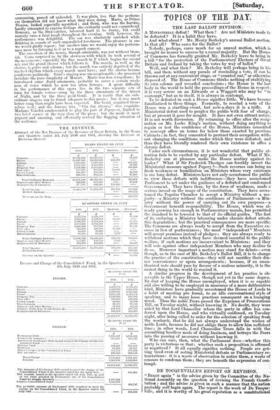TOPICS OF TIIE DAY.
THE LAST BALLOT DIVISION.
MrefisriEnikr. defeat ! What then ? Are not Ministers made to be defeated ?- It is a habit they have.
And what about ? Mr. Henry Berkeley's annual Ballot motion. Is that all? Who cares for the Ballot?
Nobody, perhaps, cares much for an annual motion, which is brought no nearer to success by a casual majority. But the House of Commons has formally granted Mr. Berkeley leave to bring in a bill " for the protection of the Parliamentary Electors of Great Britain and Ireland by taking the votes by way of ballot." Well, and what then ? Mr. Berkeley will perhaps bring in his bill, and then, without any parade of rescinding a vote, it can be thrown out at any convenient stage, or " counted out," or otherwise disposed of. The House of Commons thinks nothing of stultifying its own solemn and recorded conclusions ; the House is the last body in the world to hold the proceedings of the House in respect ; it is very severe on an Edwards or a Waggett who may be " in contempt," but as to itself, it is always in contempt. To be defeated in such a House signifies little. We have become familiarized to these things. Formerly, to rescind a vote of the House was a startling event, but now-a-days it is a trifle. A Ministerial defeat used to perplex the public with fear of change, but at present it goes for nought. It does not even attract notice. It is not worth discussion. By returning to office after the resig- nation on Mr. Locke King's motion, without doing anything to regain or test the confidence of the House, Ministers consented to reaccept office on terms far below those exacted by previous Cabinets ; in fact, they consented to protract their occupation with- out changing the conditions under which they were defeated, and thus they have literally rendered their own existence in office a chronic defeat.
Under such circumstances, it is not wonderful that public at- tention fails to be excited by any particular defeat. What if Mr. Berkeley can at pleasure make the House mutiny against its leader? What if Sir Frederick Thesiger can forcibly invert the Ministerial measure against Popery P-Such reverses can bring no fresh weakness or humiliation on Ministers whose very existence is one long defeat. Ministers have not only accustomed the public to view these defeats with indifference-they have accustomed Parliament to act under the guidance of a defeated'and condemned Government. They have thus, by the force of weakness, made a serious inroad on the usage of the constitution. They have accus- tomed the Popular Chamber to accept a Ministry without a ma- jority-a Ministry without the confidence of Parliament-a Min- istry without the power of carrying out its own purposes-a Government beneath responsibility. The House, which was al- ready growing lax enough in Parliamentary morals, has permitted the standard to be lowered to that of its official guides. The fact of its enduring a Ministry labouring under chronic defeat attests this degradation ; but the practical consequences are more specific. The Commons are always ready to accept from the Executive ex- cuses in lieu of performances ; the most " independent" Members will accept promises instead of pledges ; they are always ready to withdraw motions which they have deemed essential to the public welfare, if such motions are inconvenient to Ministers ; and they will vote against other independent Members who may decline to do so. However important a motion may stand for debate-even though, as in the ease of Mr. Berkeley's Ballot Bill, it is to change the practice of the constitution-they will not sacrifice their din- ner conveniences or opera arrangements ; because, if an unau- thorized vote should pass by favour of a zealous minority, it is the easiest thing in the world to rescind it.
A similar progress in the development of lax practice is ob- servable in the Upper House, though not yet in the same degree. By dint of keeping the House unemployed, when it is so capable and also willing to be employed in measures of a more deliberative kind, Ministers have gradually accustomed the House of Lords to a habit of meeting pro forma, to an idle conversational style of speaking, and to many loose practices consequent on a lounging mood. Thus the noble Peers passed the Expenses of Prosecutions Bill, on Tuesday night, without knowing it. No doubt, they Were aided by that Lord Chancellor whom the party in office has con- ferred upon the House, and who virtually confessed, on Tuesday night, after being called to order for the solecism'of speaking from the woolsack, that he did not always understand the wishes of noble Lords, because he did not oblige them to allow him sufficient time ; in other words, Lord Chancellor Truro falls in with the scrambling heedless mode of doing business, and betrays the Peers into the passing of measures without knowing it.
Who can care, then, what the Parliament does-whether this party is victorious or that; whether such a proposition is affirmed or negatived ? It all equally signifies nothing. People are get- ting tired even of noting Ministerial defeats or Parliamentary re- tractations : it is a waste of observation to notice them, a waste of censure to condemn them; they are beneath the expression of con- tempt.


























 Previous page
Previous page